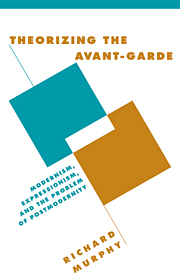Book contents
- Frontmatter
- Contents
- 1 Theories of the avant-garde
- 2 Re-writing the discursive world: revolution and the expressionist avant-garde
- 3 Counter-discourses of the avant-garde: Jameson, Bakhtin and the problem of realism
- 4 The poetics of hysteria: expressionist drama and the melodramatic imagination
- 5 Kafka's photograph of the imaginary. Dialogical interplay between realism and the fantastic. (The Metamorphosis)
- 6 Weimar silent film and expressionism: representational instability and oppositional discourse in The Cabinet of Dr. Caligari
- 7 Conclusion. Postmodernism and the avant-garde
- Bibliography
- Index
3 - Counter-discourses of the avant-garde: Jameson, Bakhtin and the problem of realism
Published online by Cambridge University Press: 22 September 2009
- Frontmatter
- Contents
- 1 Theories of the avant-garde
- 2 Re-writing the discursive world: revolution and the expressionist avant-garde
- 3 Counter-discourses of the avant-garde: Jameson, Bakhtin and the problem of realism
- 4 The poetics of hysteria: expressionist drama and the melodramatic imagination
- 5 Kafka's photograph of the imaginary. Dialogical interplay between realism and the fantastic. (The Metamorphosis)
- 6 Weimar silent film and expressionism: representational instability and oppositional discourse in The Cabinet of Dr. Caligari
- 7 Conclusion. Postmodernism and the avant-garde
- Bibliography
- Index
Summary
Döblin and the avant-garde poetics of expressionist prose
In an essay on expressionism published towards the end of the “expressionist decade” in June 1918, Alfred Döblin reflects upon the nature of such movements and how they affect the aesthetic choices and directions pursued by the writers of the time:
People are the vehicles of the movement, its creators, its movers; others enter these waters consciously or unconsciously, and go along with it. Some individuals are hardly touched by the wave, some wade in knee deep, others swim in it in fits and starts according to their own impulses, some are washed away, and after high tide are left lying flat on the beach. Many experience a purification from such a movement, many a strengthening, many a sense of direction.
Döblin himself is clearly indebted to the “purifying” and “strengthening” effects of his association with the movement of expressionism, and at another point in the essay he acknowledges its importance for him, saying that “the breakthrough, the expansion, the finding of one's feet … the emergence into the public is first made possible in this decade”(AzL, 24). As is the case also with Franz Kafka and Gottfried Benn, it can similarly be argued of Döblin that the most significant stage of his development as a writer – his “breakthrough” – occurred during the expressionist period.
- Type
- Chapter
- Information
- Theorizing the Avant-GardeModernism, Expressionism, and the Problem of Postmodernity, pp. 74 - 141Publisher: Cambridge University PressPrint publication year: 1999



